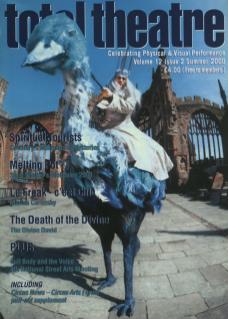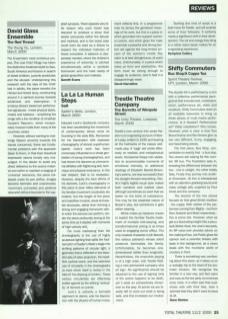The Ensemble's most ambitious project, The Lost Child Trilogy has taken the distinctive theatrical stylist to Asia, South America and Kosovo in search of street children, juvenile prostitutes and the abused. Underpinning this research with the idea of the child lost in adults, the piece reworks the Hansel and Gretel story, constructing around it a spiritual journey towards adulthood and redemption. It employs Glass' trademark performative signatures – mixed physical styles, masks and tableaux – amplifying the range with a live rendition of Jonathan Cooper's Requiem, which incorporates musical motifs from many of the countries visited.
However, without wanting to challenge Glass' sincerity towards the issues concerned, there are fundamental problems with the approach taken to them, in that their theatrical expression seems tonally very misjudged. In the desire to avoid any direct reference to the source material and rather to maintain a staging of 'universal’ relevance, the piece collapses under its own artifice. Images become hermetic and unanchored, movement outmoded and plotlines obscured without recourse to the supplied synopsis. There appears very little reason why such travel was required to produce a show that dwells exclusively within the fabular and mythical, and in the worst case could even be read as a failure to respect the individual histories of those consulted. A balance is desperately needed, where the children's experience of extremity is pitched simultaneously within a symbolic framework and the hard reality of global geopolitics and markets.

